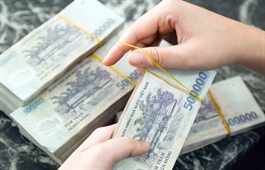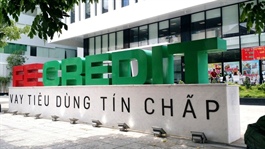Building a future of inclusive finance
Building a future of inclusive finance
Vietnam is enjoying the boons associated with the government’s effective containment of COVID-19 as well as ratification of major free trade agreements. Senior economist Nguyen Tri Hieu talked with VIR’s Dinh Thuy about development priorities for Vietnam, as well as suggests how to troubleshoot thorny issues in the financial landscape.
What should be the development priorities for the country in 2021 to build on the successes of the previous 12 months?

Senior economist Nguyen Tri Hieu
|
All the free trade agreements (FTAs) Vietnam has inked with foreign partners in recent years have opened new doors to global markets, helping to widen export potential. These markets are demanding, so our success in clinching these agreements is just the first step. More important is how Vietnam can avail of the advantages these new-generation FTAs can bring, such as tax advantages and the ease of exploiting market potential.
To be eligible for such advantages, Vietnamese goods must be of high quality and be on par with the requirements set in these agreements, as well as customers’ taste in these markets. Our major exports like coffee and rice have established a reputation in the global market, however there are technical barriers (in healthcare or in food sanitation, for example) that in many cases our products still fail to meet.
The government has set forth major guidelines for development moving forward, where security, national defence, and international cooperation and integration are taken into consideration. The signing of the FTAs paves the way for our country to meet a high level of these considerations. Ushering in a new development period, the government has given birth to a very concrete action plan that is set to bring Vietnam’s economy to new heights.
In the past year, Vietnam has successfully accomplished the goals of containing COVID-19 and achieving positive economic growth. These factors will lay the bedrock for our continued development and pushing up international integration in successive years. In addition, the launching and development of 5G is expected to bring Vietnam’s mobile communications traffic to a new level with high volumes, enabling smartphone users to grab information more swiftly and efficiently.
How can the efficient implementation of the amended versions of laws on investment, enterprises, and securities be ensured?
The amended laws, which came into force in 2021, aim to facilitate development of the stock market and investment market, but set new rules for market participants. That means while they are supposed to continue to support businesses, they are designed to create a stricter legal corridor to regularise the markets..
As the country’s economy evolves, legal mechanisms must adapt to the market and provide clear and concrete guidance for enterprises to follow, while eliminating overlaps and outdated regulations.
To join the new playing field, firms must strictly comply with these regulations. We all know that economic activities, once governed by strict regulations, could ensure a fair competition between diverse economic sectors, and that is a prerequisite for development.
One of the essential matters to ensure the effective enforcement of these laws is that the relevant admin agencies that implement the laws – such as the Ministry of Industry and Trade, the Ministry of Planning and Investment, the State Bank of Vietnam (SBV), and tax authorities – must craft particular action programmes. The government’s supervisory office should be continuingly tracking the performance by these administrative agencies and alert the agencies for any irregularities and obstacles.
As government changes now take place, the new administration needs to present a report by the end of the year showcasing to policymakers and people what we have achieved with the laws, what the shortcomings are, and which contents need to be supplemented to have practical views on whether these revisions could bring the expected results.
One of the most outstanding points in the domestic market in 2020 was the intensified appearance of mobile money services. What are the challenges to be resolved to promote these services and ensure the market’s healthy performance?
Several leading telecom groups including Viettel, MobiFone, and VinaPhone were green lit by the government to come up with mobile money services through acquiring intermediary payment licenses. This means a large proportion of the population in rural areas who are still unbanked can now carry out transactions if they have a smartphone and deposit some money on their accounts opened by these groups.
These mobile money services can be deemed digital money as it could be used for business transactions. This, however, also poses a risk of “money creation” outside the banking system. Until now only the central banks and commercial banks are allowed to “create” money.
Now, telecoms companies may be able to give any credits to their customer’s account and their customers may use these credits to pay for purchases – and so the telecoms companies are in fact given the ability of “money creation”.
Of course, we may expect that any credits are equivalent to the money their customers give to them or deposit. In that case it is balanced out, and there is no money creation. But what kind of control needs to be in place so that the telecoms companies don’t abuse the ability is the crucial issue the banking authority needs to consider.
Further, we must ensure that the telecom groups must not use deposited money for any other purpose, other than to settle customer purchases. Any company may utilise short-term investments including intra-day investments where the money flow returns at the end of the day but such investments may risky by essence.
If telecoms firms use money deposited by their customers for such investment, they are exposed to potential losses. Regulations should be in place to prevent the telecoms companies from being engaged in such transactions.
I do believe all telecoms groups are overseen by the government and strictly adhere to the law, but the problem is we must have in place a proper supervisory mechanism and I do not see that at this point at time.
Vietnam’s financial landscape has seen the strong emergence of foreign exchange trading floors, meaning colossal risks to investors. What is the state of the current operation of forex trading floors in this country?
Scores of forex trading floors have sprung up around Vietnam in the past year that invite investors with very tempting profits that may be 10-fold higher than bank rates. Such trading floors are often fraudulent, however. They secured people to participate with high profits and security against losses. They actually pay their investors with profits as promised but when investors invest in a big sum, they cause the forex floors to collapse.
The victims can do nothing in the absence of legitimate contracts, and so this mandates prudent consideration by the central bank and the MoF.
In fact, albeit some trading floors – some functioning as information portals – are based in Vietnam, all the transactions occur outside the country’s territories. For example, these platforms for forex trading can claim they are part of UK-based exchanges. Vietnamese people can do business transactions in the UK through the Vietnamese-based platform. The payment can be processed through customers’ credit cards in foreign currencies and the procedure seems legal as it appears not to impinge on regulations on forex trading.
The operation of such a forex market would raise a question as to whether their operation is legal or not, especially if Vietnamese participants transact only in foreign currencies and have nothing to do with VND, and they pay for their currency purchases with credit cards.
To increase the appeal of Vietnam’s stock exchanges, how can foreign-invested enterprises be encouraged to participate?
Most foreign firms receive capital injections from their parent companies or from foreign financial institutions, which is their advantage. They therefore are not as much reliant on local capital sources compared to Vietnamese ones. Partly foreign-owned firms may consider listing on a bourse once having a certain volume of potential local shareholders.
We should encourage foreign companies to move into the stock market because in doing so they will need to ensure information transparency and this will bring benefits to both shareholders and investors.
We know that many such enterprises operating in Vietnam have relations with overseas companies which also export their products to Vietnam. Through trade agreements, we may encourage these overseas firms to not only sell products to Vietnam, but also support their subsidiaries here to go on the bourse to participate in Vietnam’s financial market.
In addition, relevant government agencies and ministries would help firms go on the bourse here, wading through a complexity of procedures and legalities. With simpler procedures, foreign firms may participate in the stock market more vigorously.
























